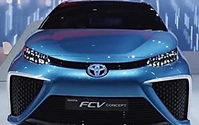automotive
Industry Talks Tech And DC Currents In D.C.
- by Karl Greenberg , January 22, 2014
 The Washington Auto Show is unique. It is the only international auto show that is as much for policymakers as consumers and manufacturers. Thus, the content is inordinately about
alternative powertrains, advanced driving technology and infrastructure.
The Washington Auto Show is unique. It is the only international auto show that is as much for policymakers as consumers and manufacturers. Thus, the content is inordinately about
alternative powertrains, advanced driving technology and infrastructure.
Mark Fields, COO at Ford, who had to scuttle his appearance because of the weather, teleconferenced to talk about Ford's sustainability program. Ford stole headlines at the Detroit show with the aluminum-bodied 2015 F-150, which Ford says is 700 pounds lighter, though mileage numbers are still unknown.
Ford has a couple of technology platforms that will appeal to Washington: a Blueprint for Sustainability evinced by programs like Eco boost, its electrification strategy and the kinds of weight savings demonstrated by the F-150, and fuel cells. The other platform is Blueprint for Mobility to address the downside of booming car sales worldwide. "Right now, there are a billion vehicles on the road around the world, and we are facing global gridlock."
advertisement
advertisement
He said the company's short-term programs are around traffic jam and accident avoidance. In the medium term, the automaker is working on vehicle-to-vehicle communications toward achieving a degree of "auto-pilot" capability to cars. Long-term is a program to develop "connected cars that communicate with each other and the world around them, fully autonomous navigation and integrated network for all transportation."
Toyota's Nihar Patel, VP, North American business strategy, said the automaker is focused on hydrogen fuel cell technology, and, by next year, will sell a fuel cell vehicle in the U.S. based on the FCV it introduced in Detroit. "In the past 20 years, our fuel cell R&D has been immense.” The car, he says, is a “zero-emission electric sedan that gets 300 miles on a single fill-up that takes less than five minutes. The rate of cost reductions on hydrogen fuel cells is staggering versus battery electric."
Hyundai's Mike O'Brien, VP of corporate and product planning, talked about the automaker's plans to roll into hydrogen with the Tucson Fuel Cell vehicle, which will be sold in limited volume in California this spring with a package including at-home service and maintenance and free hydrogen fuel. He said that while vehicles that we normally think of as "electric," those using battery stacks to store electricity via external charging are part of a short-term solution, hydrogen fuel cell cars, those that make electricity on board, will ultimately solve the powertrain tech problem.
"The market for BEVS (battery electric vehicles) has grown, but adoption is limited by range anxiety. For all but most expensive, range remains top obstacle. Fast-charging stations still take half an hour and come at expense of battery life." By contrast, he notes, hydrogen fuel-cell cars make their own electricity, and fueling takes minutes, "and range matches gas-powered and is cleaner than todays' battery EVs."
Brendan Jones, director, electric vehicle infrastructure strategy at Nissan's U.S. division, acknowledged the range anxiety issue and how that limits volume. He said the company is doing a multi-pronged approach to helping create infrastructure growth around charging stations at dealers, at work and in high-ownership volume communities, via partnerships with charging device companies. The company also has dedicated liaisons for building partnerships with hundreds of companies like Oracle, Google, and Microsoft for promoting sales and build-out of on-campus charging stations. "We have sold 1,000 Leafs directly as result of these deals," he says.




